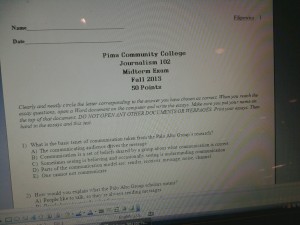I recently prepared an exam for students in my media communications class. It’s a multiple choice test with two essay questions. At some point during the process, I realized four hours had passed and I still had more notes to pore over before I completed the exam. Not only that, I still had proofreading and copy editing that would follow the exam construction.
I became overwhelmed. But I became overwhelmed not because test-making is something new for me. It’s not. I’ve constructed exams for a multitude of communication and journalism related classes.
I became overwhelmed because there was so much material we had covered so far in the semester and I wanted to test the students on everything. But, really, that’s impossible. This is an exam for a 75 minute class. It’s not the bar exam for lawyers nor is it the SATs for high schoolers headed toward college or university.
There’s no way anyone should be expected to regurgitate all the information or all the lessons we’ve learned. Pick the big things that actually change us or shape our world view.
I remember when I was working my first permanent job in television news. I was organizing newscast scripts next to Frank the director. Melissa was nearby producing the 6:00p.m. show.
Melissa had attended graduate school and earned a master’s degree in history. I don’t remember the conversation topic between she, Frank and me, but I remember it involved historical facts.
Frank asked Melissa about a time, date, or place involved in whatever was under discussion.
She put the straw to her can of soda pop in her mouth, took a sip, then quickly said with impatience, “I don’t know.”
“You don’t know?” Frank was shocked and his voice went up an octave. “I thought you had a master’s in history.”
“I do,” Melissa said matter-of-factly.
Years later and long after Melissa moved on to another city, Frank still brings up that conversation. “I can’t believe she had a master’s degree in history and didn’t even know history.” In fact, he brought up that conversation after I told him I was headed to grad school.

Anyone with an advanced degree can attest to this: it is impossible to know everything about a topic. Also, depending on your focus of study, you’re not going to be able to fully expound about everything in your discipline. Maybe Melissa’s focus was– as was the focus of my colleague and friend Tim– on California history and not the Civil War or Europe or whatever she and Frank were discussing.
My degree is in communication studies with a primary concentration in media and a secondary concentration in public and political. Am I able to have a delightful and engaging dialogue with grad school cohorts about intercultural or interpersonal communication? Of course I am, but not to the degree they can.
The point is that it’s easy to become overwhelmed by the breadth of information that exists about any topic. It’s perfectly okay to not know everything even if people expect you to. Know what you do not know.
I’ll stop overthinking my media communications exam.

